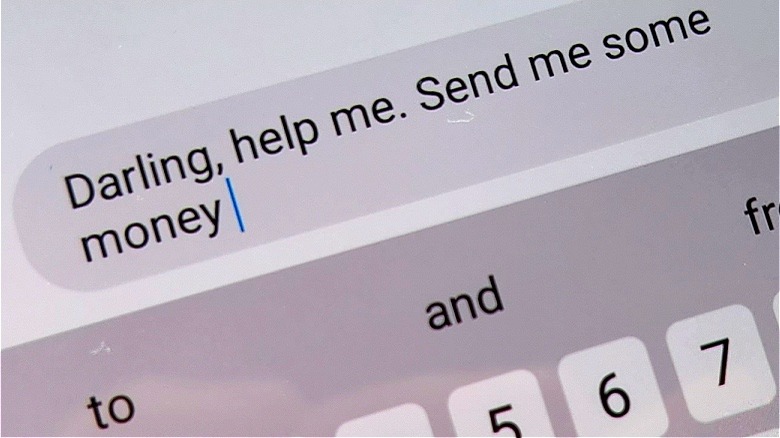Telltale Signs A Romance Scammer Is Making A Move On Your Money
Finally, after years of mediocre first dates, loneliness and wondering why true love keeps evading you, a charming stranger suddenly appears in your Instagram DMs expressing interest. Things move incredibly fast, with this person professing their love within days and referring to you as their "king" or "queen." Who doesn't want that? Ultimately, they seem too good to be true ... except for the fact that there are some major red flags about them. For example, months have passed and you've never actually spoken to them on the phone or seen their face via video chat. They're just busy, right? But before you know it, this individual is asking you to send money. And not just $20 so that they can get gas. They're requesting thousands.
This isn't the love of your life, but rather a romance scammer: that is, an individual who preys on vulnerable men and women online to take advantage of their desire for companionship for financial gain. According to the Federal Trade Commission's Consumer Sentinel Data Book 2023, such scams are rather common, especially among the financial scams targeting senior citizens. In 2023, 64,003 romance scams were reported, with a total loss of $1.14 billion, or an average of $2,000 per person. If you're wondering whether that new person with whom you're chatting online is interested in you or your savings account, there are a few telltale signs that give away their wicked intentions.
How to tell if your online love is a scammer
Whether they're sending a DM on social media or a "like" on a dating site, romance scammers are typically the ones to make first contact. That's because, unbeknownst to the victim, the scammer has conducted research and tracked down the perfect target. While not every DM has malice behind it, everyone should be wary of any stranger who contacts them out of the blue.
Most romance scammers aren't targeting the one-off unsuspecting victim; instead, these scammers are conversing with multiple individuals simultaneously. They can't afford to mix up names or other details, so terms of endearment, like "queen," "king," and "babe," are part of their script. And within days, they're moving on to another telltale sign of a romance scam: expressing their love and asking to pivot your chat to an encrypted platform like WhatsApp, where it's hard for law enforcement to retrieve deleted messages.
Often, the scammer claims that they have a job that requires work overseas. They say there's poor phone service, which is why they can never hop on a call or video chat. Then, a dramatic event, such as border detainment or a medical issue, occurs, and they need a few thousand dollars. If someone was previously unsure about their virtual love interest's true intentions, this request for emergency funds should be the wakeup call. Still, more often than not, the person is emotionally invested and agrees, even under extremely sketchy circumstances, like when the scammer asks them to open a bitcoin account.
Who exactly are these romance scammers?
While romance scammers can be located anywhere in the world, the United States Secret Service revealed the bulk of them hail from Nigeria. In fact, there's an entire Nigeria-based group called the Yahoo Boys, who create fake accounts — sometimes using deceptive AI tools (one of many money scams to watch out for) — to earn trust and drain victims of their money, whether it be their Social Security or late spouse's life insurance. Some of these financial scammers are trying to obtain the money for themselves, while others are "money mules," or the middle men who handle funds on behalf of another. In fact, a number of victims are coerced into becoming money mules themselves.
Blinded by love, victims have no idea who they're actually conversing with on the other side of the screen. Romance scammers will either use AI technology to transform their own appearance, or steal photos/videos from an unsuspecting stranger and assume their identity online. For these scammers, everyone is fair game, too, including celebrities. On the YouTube series "Scamfish," one woman was convinced she was messaging with Johnny Depp, while another believed that Bee Gees legend Barry Gibb was in love with her (despite there being no reports of trouble in paradise with his longtime wife Linda Gray).
So, if a romantic stranger on the internet seems too good to be true — or if a ridiculously wealthy celebrity is asking for money — it's a telltale sign you're likely the target of a romance scam and you should exit the situation immediately. That said, here's how to try and get your money back after being scammed.


